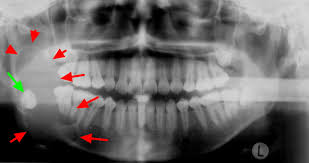+919790726189

This is your website preview.
Currently it only shows your basic business info. Start adding relevant business details such as description, images and products or services to gain your customers attention by using Boost 360 android app / iOS App / web portal.
MANAGEMENT OF AMELOBLASTOMA AT WEST MAMBALAM AS...

MANAGEMENT OF AMELOBLASTOMA AT WEST MAMBALAM ASHOK NAGAR CHENNAI Ameloblastoma: A Rare Yet Significant Jaw Tumor Ameloblastoma is a rare, benign but locally aggressive tumor that originates from the odontogenic epithelium, the tissue responsible for tooth development. It predominantly affects the jawbones, with the mandible (lower jaw) being the most common site. While it is non-cancerous, its aggressive nature and potential for recurrence make it a condition requiring timely and expert management. Causes and Risk Factors The exact cause of ameloblastoma is not well understood. However, it is believed to arise from residual epithelial cells associated with tooth development. Genetic mutations, trauma, or infection may act as contributing factors. Ameloblastoma commonly occurs in adults aged 30-50, though it can also affect younger individuals. Symptoms Ameloblastoma often grows slowly and may initially remain asymptomatic. As it enlarges, symptoms such as: Swelling in the jaw or face Pain or discomfort Difficulty in chewing or speaking Loosening of teeth may appear. In severe cases, the tumor may cause facial asymmetry or even invade adjacent structures. Diagnosis Early diagnosis is crucial for effective treatment. Dentists may detect ameloblastoma during routine X-rays, where it appears as a radiolucent (dark) area in the jawbone. Further investigations, such as: CT scans or MRIs to assess tumor extent Biopsy for histopathological confirmation are performed to confirm the diagnosis. Treatment Treatment typically involves surgical removal of the tumor along with a margin of healthy tissue to minimize recurrence. Depending on the tumor’s size and location, procedures may range from conservative enucleation to more extensive jaw resections. In some cases, reconstructive surgery may be required to restore jaw function and aesthetics. Adjuvant therapies like radiation or targeted molecular therapies are considered for aggressive or recurrent cases. Prognosis and Follow-up Despite being benign, ameloblastomas have a high recurrence rate if not treated adequately. Long-term follow-up, including periodic imaging and clinical evaluations, is essential to monitor for recurrence. Conclusion Ameloblastoma, though rare, can significantly impact oral and overall health if left untreated. Early diagnosis and comprehensive treatment are key to managing this condition effectively. If you notice any unusual swelling or discomfort in your jaw, consult your dentist or oral surgeon promptly. Dental Clinics in West Mambalam Dentists in West Mambalam Dentists in Ashok Nagar Best dentist near me Best Dental Clinics in West Mambalam Oral surgeon in West Mambalam Dental Implants in West Mambalam

